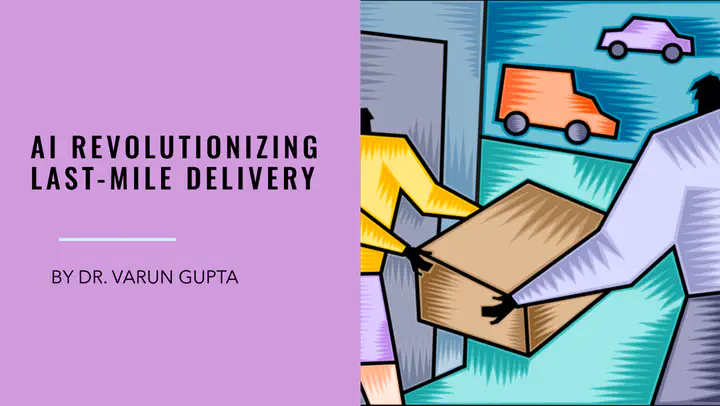🚚💡 AI Transforming Last-Mile Delivery: Solving Challenges & Driving Efficiency in Parcel Delivery 📦🤖

In the fast-paced world of parcel delivery, #last-mile #delivery has long been a challenge for major players like Fedex, UPS, and others. As the demand for e-commerce grows, the pressure on logistics systems has escalated. Consider this: 67% of shoppers abandon their carts due to unexpected shipping costs or delays, and porch piracy results in over 1.7 million packages stolen or lost daily in the U.S., costing companies billions annually. 📉💸 The struggle to provide precise delivery windows, prevent losses, and increase customer satisfaction has never been more intense. How can the industry combat this? Artificial intelligence (AI) is proving to be a game-changer. 🚀
🚀 AI in Last-Mile Delivery: Real-World Solutions
Companies like FedEx and UPS are investing heavily in AI to streamline and optimize last-mile delivery. AI helps with:
- More accurate shipping time estimates ⏳: By leveraging real-time data and machine learning, AI models can predict the most efficient routes and delivery times, reducing customer frustration with missed or late deliveries.
- Combating porch piracy 🚪🛑: AI-driven surveillance systems and smart lockers are making theft detection and prevention more robust. Packages are being tracked more precisely, and companies can offer dynamic delivery options, including real-time adjustments based on customer location.
- Dynamic rerouting and delivery optimization 🛣️: AI helps delivery systems re-optimize routes on the fly, saving fuel and time and reducing operational costs and environmental impact.
- Package damage prediction 📦🔍: AI can assess and predict potential package damage during transit, improving handling procedures and reducing customer complaints.
These AI solutions improve customer satisfaction and significantly reduce costs for delivery giants. With AI-driven systems, UPS reported over $200 million in annual savings through their ORION route optimization system, powered by AI and advanced analytics. 💰💡
📊 Industry Implications & Broader Trends
AI’s successful integration into last-mile logistics creates a ripple effect across retail, e-commerce, and grocery delivery sectors. By adopting AI, these industries can cut costs, reduce waste, and enhance customer experiences.
- Retail: Retailers can use AI to offer more precise delivery estimates, allowing for better inventory management and reducing the occurrence of out-of-stock items.
- E-commerce: AI enables e-commerce platforms to enhance customer personalization, providing real-time tracking and updates that boost trust and loyalty.
- Generative AI 🔄🤖: As we dive deeper into AI, generative AI is now being tested to predict customer demand trends, simulate logistics networks, and even automate customer service via AI chatbots, cutting manual labor and reducing human error.
🔮 Looking Ahead: AI’s Future in Logistics
The future of AI in logistics is incredibly promising but not without challenges. Generative AI, while exciting, brings complexities in terms of data privacy, cybersecurity, and integration with existing systems. However, FedEx and UPS are pioneering new AI frameworks to make these advancements a reality, ensuring continued efficiency gains.
As AI transforms parcel delivery, retail, e-commerce, and logistics industries can all benefit by adopting AI-driven solutions that enhance efficiency and reduce costs. 🎯 Whether it’s using machine learning to reduce delivery times or generative AI to automate warehousing, this wave of innovation is just the beginning!
Are you ready to unlock the power of AI in your organization? 🚀🤖 Let’s discuss how this technological revolution can transform your logistics and supply chain operations!
#LogisticsInnovation #AIDriven #LastMileDelivery #SupplyChainTech #GenerativeAI #EcommerceOptimization #FedEx #UPS #CustomerSatisfaction #FutureOfLogistics #AIForGood #DigitalTransformation #ParcelDelivery 📦🔗